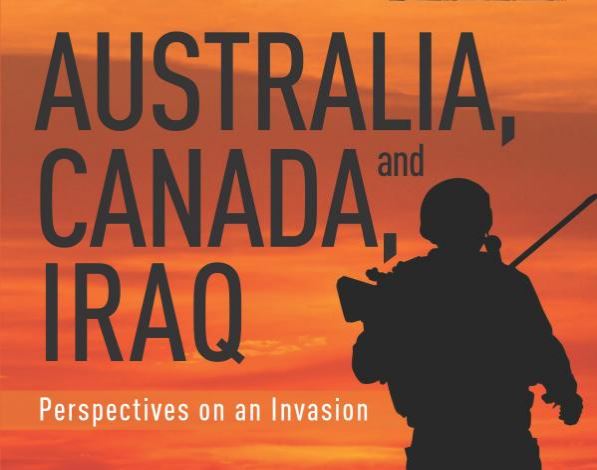Reading Room: Australia, Canada, and Iraq: Perspectives on an Invasion

Australia and Canada are divided by a vast ocean, the pronunciation of a common language and unequal capacities in French and cricket. Nonetheless, the two nations trust each other to such an extent that in some countries we take on each other’s diplomatic responsibilities. So it was natural for Canadian and Australian academics with an interest in international affairs to meet and compare the most contentious decision their governments made in the past decade: whether to join the US and UK invasion of Iraq in 2003. An initiative of the ANU’s Ramesh Thakur and the University of Toronto’s Jack Cunningham has produced 14 illuminating essays by leading authorities in each country.
Other People’s Wars
Canada’s economy is integrated with that of the US to such an extent that Canadians fear what Hugh White in his essay calls American ‘entrapment’. Australia, on the other hand, fears abandonment by the US and is always, as William Maley points out, looking for new ways to win American gratitude. Canada has a record of declining US military proposals without harm to the relationship, Kim Nossal shows, citing Brian Mulroney’s rejection of Reagan’s ‘Strategic Defence Initiative’. Jean Chrétien’s refusal to join the ‘Coalition of the Willing’ in Iraq was less tactful but after these essays were written, Justin Trudeau became Prime Minister and withdrew Canadian bombers from Syria. He and President Obama apparently remain on good terms. Canada, unlike Australia, is prepared to stand up for its right to make its own foreign policy. Moreover Canada, as Bill Graham points out, debates military deployments in parliament and votes upon them in advance, which Australia does not.
Australia, having fought wars ever since settlement, emerges from these essays as the more belligerent nation. Australians are quick to get behind government policy once the troops are deployed, even when a majority initially oppose war. Ian McAllister shows this happened with the Iraq invasion, although opposition later revived. In spite of going into Kosovo without a Security Council mandate, Canada is more inclined to insist on international law than to ignore or misinterpret it, as Bush, Blair and Howard did in Iraq. Of course, governments change and Prime Minister Harper was as hostile to the UN as the Anglo-allies were and he was even more willing to send Canadians into Iraq and Syria in 2014. But when the US demands a commitment of forces, Canadians tend to ask questions first and preserve their national interest. Australians don’t define the national interest and don’t even ask questions afterwards.
One contributor singles himself out among the 14 as yesterday’s man. In his piece, ‘We were right to invade Iraq’, former prime minister John Howard unrepentantly claims the whole world believed Iraq had weapons of mass destruction, blames intelligence agencies for this error and claims Iraqis are better off without Saddam Hussein. He chose not to listen to contrary advice in 2002-3 and he obstinately rejects it now. This is why Canada’s example, which takes the war power out of the hands of the prime minister alone, is one for Australia to consider.
Ramesh Thakur and Jack Cunningham, eds. Australia, Canada, and Iraq: Perspectives on an Invasion, Toronto: Bill Graham Centre for Contemporary International History, Trinity College, The Munk School of Global Affairs, University of Toronto, 2015.
Dr Alison Broinowski is a Research Affiliate at ANU and Vice-President of Australians for War Powers Reform.





